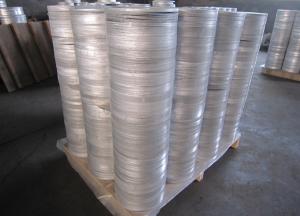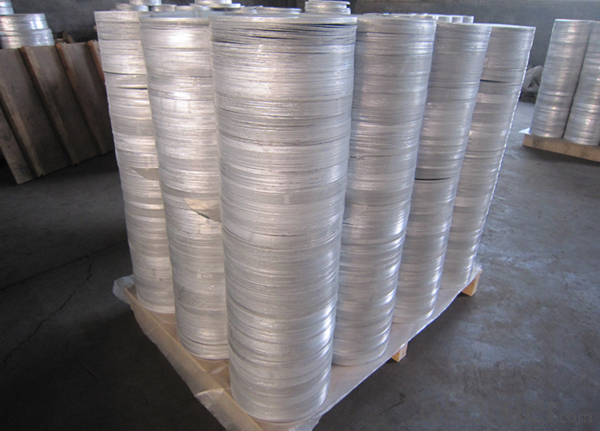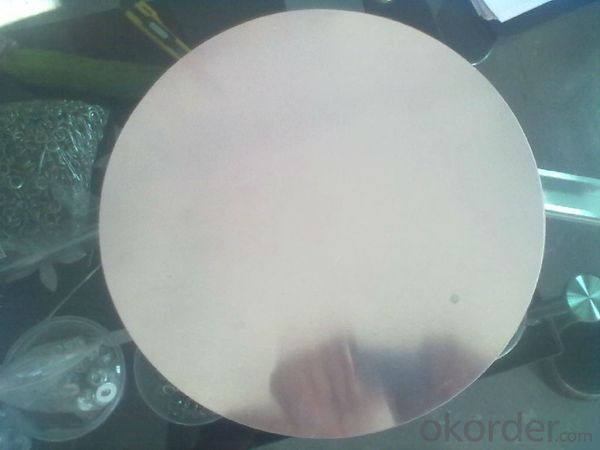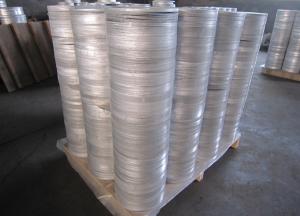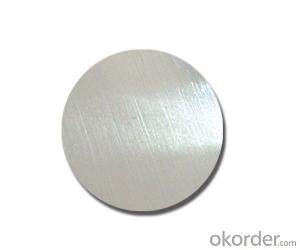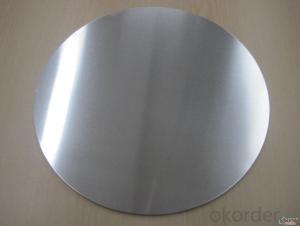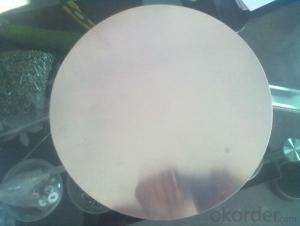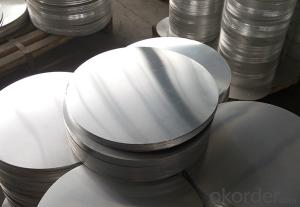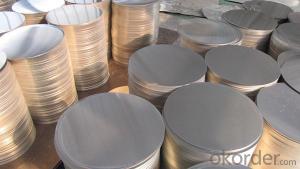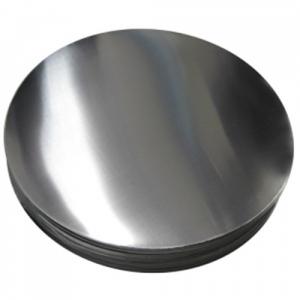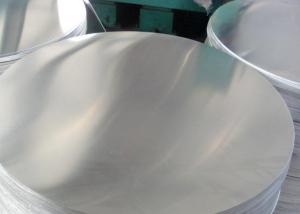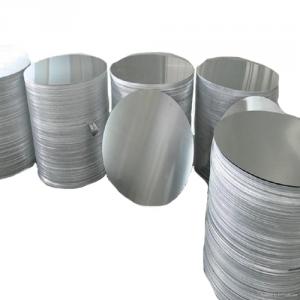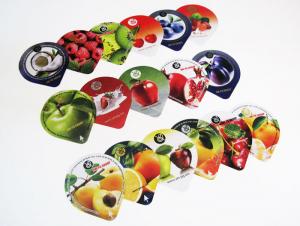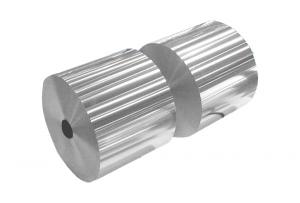Aluminum Hot Rolled AA1100 Circle Sheet
- Loading Port:
- Shanghai
- Payment Terms:
- TT OR LC
- Min Order Qty:
- 5 m.t.
- Supply Capability:
- 10000 m.t./month
OKorder Service Pledge
OKorder Financial Service
You Might Also Like
Specification
1. Structure of Aluminum Circle Sheet with Hot Rolled AA1100 Description
• Product: Aluminim Circle
• Application: It is used in cookware, engineering, lighting purpose, fried pans, non-sticky pans, cooking pots, kettles, hard anodize cook wire, pressure cooker and house hold utensils, reflector of the light, etc
• Advantage: Deep drawing and hard anodizing quality Aluminum Circle Sheet can be supplied. Our Aluminum Circle is RoHS and REACH compliance and uses well-protected packing. Our circles are excellent material for producing cookware, utensil, pots, pans and kettles.
2.Main Features of the Aluminum Circle Sheet with Hot Rolled AA1100
• High manufacturing accuracy
• Smooth surface
• No waves
• High strength of extension and yield
• Well packaged
3. Aluminum Circle Sheet with Hot Rolled AA1100 Images
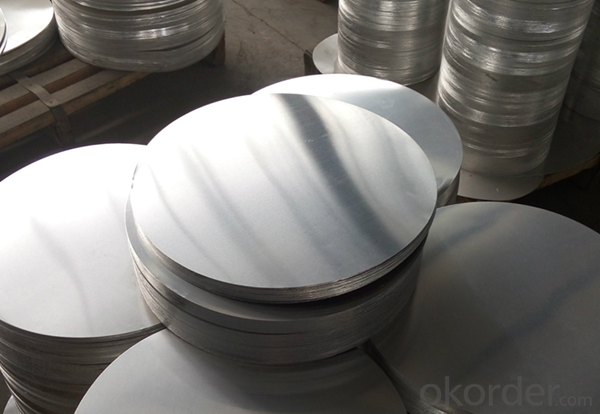
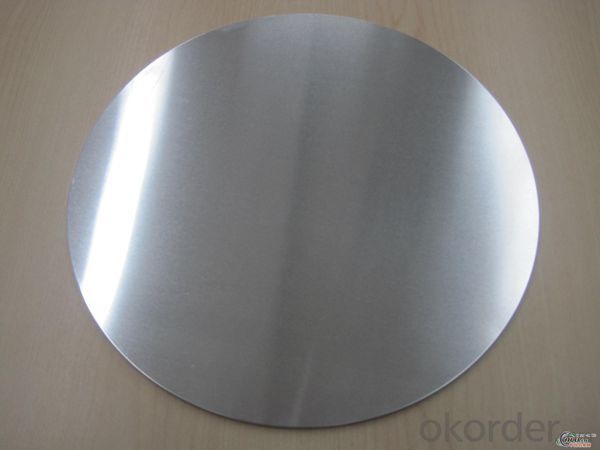
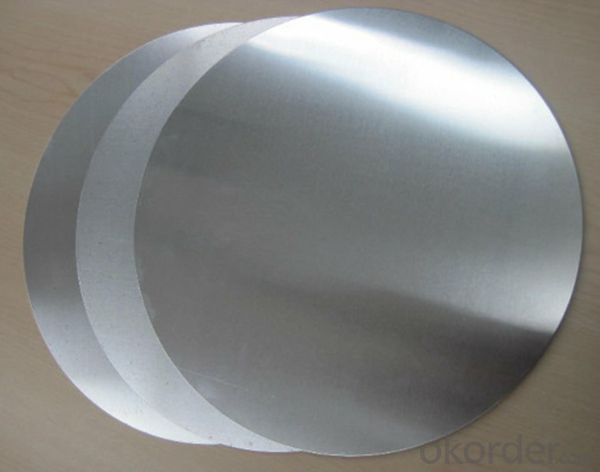
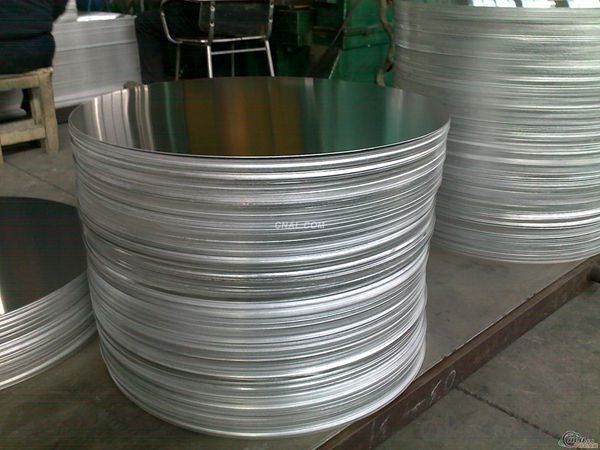
4.Aluminum Circle Sheet with Hot Rolled AA1100 Specification
Alloy | AA1050,AA1060,AA1100 AA3003etc. |
Temper | O,H14 |
Thickness | 0.5MM-4MM |
Diagonal | 100-1200MM |
Standard | GB/T 3880-2006 |
5.FAQ of Aluminum Circle Sheet with Hot Rolled AA1100
We have organized several common questions for our clients,may help you sincerely:
① How about your company?
A world class manufacturer & supplier of aluminum coil and alloy blanks. Aluminum production base is comprised of 18 aluminum annealers, 10 coil and foil mills, 4 continuous production lines, 2 hot rolling production line and 3 prepainted lines.
Export 5000 tons per month to Asia, America and Middle East. Always do the best for our clients.
②Can you guarantee the quality of the products?
We are responsible for the quality of materials to get a long-term cooperation with clients in a reasonable period of time and we are glad to arrange and coordinate any third party inspection for you.
③What is the delivery time after purchase?
35 day after receiving client’s deposit or correct LC
- Q: This question asks whether exposure to aluminum can lead to allergic reactions.
- <p>While aluminum is one of the most abundant elements on Earth and is commonly used in various products, most people do not experience allergic reactions to it. However, a small percentage of individuals may have an allergy to aluminum, which can cause contact dermatitis or other allergic responses. Symptoms can include redness, itching, and swelling at the site of contact. It's important for those with known aluminum allergies to avoid products containing aluminum and to consult with a healthcare provider for proper diagnosis and management of their allergy.</p>
- Q: What are the various applications of aluminum oxide in different industries and daily life?
- <p>Aluminum oxide, also known as alumina, has a wide range of applications due to its hardness and other properties. It is used as an abrasive in products like sandpaper and grinding wheels. In the electronics industry, it serves as a substrate for semiconductor devices. It's also a key component in the production of aluminum metal through the Hall-H茅roult process. In the medical field, aluminum oxide is used in dental materials and as an antiperspirant. Additionally, it's found in cosmetics, ceramics, and as a catalyst in various chemical processes.</p>
- Q: This question asks for typical applications of aluminum in various industries and everyday life.
- <p>Aluminum has a wide range of common uses due to its lightweight, corrosion resistance, and high strength-to-weight ratio. It's extensively used in the manufacturing of transportation vehicles like cars, airplanes, and bicycles for its strength and low weight. In construction, aluminum is used for window frames, roofing, and facades. It's also prevalent in food and beverage packaging due to its excellent barrier properties. Other uses include electrical wiring, electronics, and everyday items like pots and pans. Additionally, aluminum is used in the production of various alloys to enhance the properties of other metals.</p>
- Q: Is it possible to utilize recycled aluminum in the manufacturing of automobiles and other types of vehicles?
- <p>Yes, recycled aluminum can be used to make automobiles and other vehicles. It is a common practice as aluminum is highly recyclable and retains its properties even after multiple recycling processes. Using recycled aluminum reduces the need for new aluminum production, which is energy-intensive, and contributes to sustainability efforts. Recycled aluminum is often used in vehicle components such as engine parts, body panels, and wheels, due to its lightweight, strength, and corrosion resistance.</p>
- Q: This question asks for various applications or purposes that can be served by using aluminum scrap material.
- <p>Aluminum scrap can be repurposed in numerous ways due to its recyclability and durability. Some alternative uses include manufacturing new aluminum products, such as cans, foil, and automotive parts. It can also be used in construction for materials like window frames and roofing. Additionally, aluminum scrap is utilized in the production of everyday items like bicycles, furniture, and even in some types of cookware. Furthermore, it can be employed in the aerospace industry for aircraft parts and in the electronics industry for components. Recycling aluminum scrap not only conserves resources but also reduces energy consumption and environmental impact.</p>
- Q: Is it safe and effective to use aluminum foil for wrapping food items in a freezer?
- <p>Yes, you can use aluminum foil to wrap food in the freezer. Aluminum foil is a good insulator and can help protect food from freezer burn. It also prevents cross-contamination and keeps odors from affecting other foods. Ensure the foil is tightly wrapped around the food to maintain freshness and quality. However, for long-term storage, it's recommended to use airtight containers or freezer-safe plastic bags in addition to or instead of foil, as they can provide better protection against freezer burn and moisture loss.</p>
- Q: What are some examples of alloys that can be created using aluminum as a base metal?
- <p>Aluminum can be alloyed with various elements to create a range of alloys, each with unique properties. Some common aluminum alloys include 1000 series (99% pure aluminum), 2000 series (aluminum-copper), 3000 series (aluminum- manganese), 5000 series (aluminum-magnesium), 6000 series (aluminum- magnesium- silicon), and 7000 series (aluminum-zinc). These alloys are used in different applications such as aerospace, automotive, construction, and packaging due to their strength, corrosion resistance, and light weight.</p>
- Q: This question asks about the potential health hazards associated with exposure to aluminum in a work environment.
- <p>Working with aluminum can pose certain health risks, primarily due to inhalation of aluminum dust or fumes. Chronic exposure may lead to respiratory issues such as aluminum lung disease, characterized by shortness of breath and cough. Additionally, aluminum has been linked to neurological disorders, including cognitive dysfunction and memory loss. There's also evidence suggesting a potential connection to Alzheimer's disease, though this is not conclusively proven. Skin contact with aluminum can cause irritation or allergic reactions in some individuals. It's important for workers to use proper protective equipment and follow safety guidelines to minimize these risks.</p>
- Q: Explain the relationship between aluminum and electrum, if any.
- <p>Aluminum and electrum are two distinct metals with no direct relationship. Aluminum is a lightweight, silvery-white metal that is the most abundant metallic element in the Earth's crust. It is known for its corrosion resistance and is widely used in various industries. Electrum, on the other hand, is a naturally occurring alloy of gold and silver, valued for its unique properties and historical significance. While both metals are used in various applications, they are chemically and physically different and do not have a direct connection.</p>
- Q: What are the primary applications and benefits of aluminum in various industrial sectors?
- <p>Aluminum is extensively used in the industry due to its lightweight, high strength, and excellent corrosion resistance. It is a key material in the aerospace industry for aircraft construction to reduce weight and improve fuel efficiency. In the automotive sector, aluminum is used for engine parts and body panels to enhance fuel economy and performance. The construction industry utilizes aluminum for window frames, roofing, and structural components due to its durability and low maintenance. Aluminum is also prevalent in the packaging industry for food and beverage cans, and in electrical applications for wiring and transformers due to its high conductivity. Its recyclability makes it an environmentally friendly choice, further enhancing its industrial applications.</p>
Send your message to us
Aluminum Hot Rolled AA1100 Circle Sheet
- Loading Port:
- Shanghai
- Payment Terms:
- TT OR LC
- Min Order Qty:
- 5 m.t.
- Supply Capability:
- 10000 m.t./month
OKorder Service Pledge
OKorder Financial Service
Similar products
Hot products
Hot Searches
Related keywords
